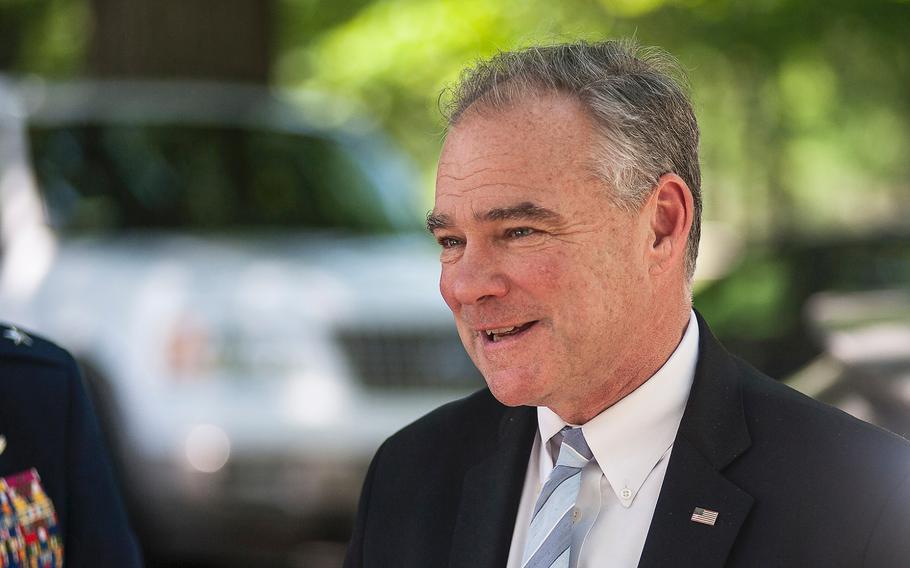
Sen. Tim Kaine chats outside the Russell Senate building on Capitol Hill in Washington, D.C. on May 17, 2017. (Carlos Bongioanni/Stars and Stripes)
WASHINGTON — Sens. Bob Corker and Tim Kaine, the Republican chairman and a Democratic member of the Senate Foreign Relations Committee, filed bipartisan legislation late Monday to revamp the president’s war powers.
The move follows several others on Capitol Hill to update the the president’s authority for use of military force, or AUMF, powers. But the legislation could face an uphill battle winning support on the Senate floor: similar attempts in recent months have failed.
“There have been a number of efforts over the years to update these authorities, and while there is still work ahead, I am pleased that we have reached an agreement on a product for the committee to consider,” said Corker, R-Tenn.
Corker hopes the legislation “will ultimately strike an appropriate balance of ensuring the administration has the flexibility necessary to win this fight while strengthening the rightful and necessary role of Congress.”
The legislation, which is cosponsored by Sens. Jeff Flake, R-Ariz., Chris Coons, D-Del., Todd Young, R-Ind., and Bill Nelson, D-Fla., also strengthens congressional oversight and transparency, and provides updated war powers to fight terrorist groups abroad, the sponsors said.
Corker acknowledged Monday that as long as he has helped lead the Senate Foreign Relations Committee, starting as ranking member in 2013, the committee have been engaged in a discussion over the AUMF, which provides the legal authority necessary to fight terrorists abroad.
Though the move has been in the works for several months, the effort comes days after U.S. forces took part in an attack on chemical weapons facilities in Syria. Some congressional members have questioned whether President Donald Trump had the legal authority to order the strike on Syria. The legislation also highlights the ongoing conversation on whether to revamp the president’s war powers, which many lawmakers argue are outdated.
The president’s AUMF powers were issued in response to the 9/11 terrorist attacks in 2001 and 2002 when the United States went to war in Afghanistan and Iraq.
The proposed legislation would repeal those AUMFs within six months of becoming law.
“For too long, Congress has given presidents a blank check to wage war. We’ve let the 9/11 and Iraq War authorizations get stretched to justify wars against multiple terrorist groups in over a dozen countries, from Niger to the Philippines,” said Kaine, D-Va., who is also a member of the Senate Armed Services Committee. “Congress has painstakingly avoided this debate for years because war votes aren’t easy. But if we’re going to ask our troops to risk their lives in support of a mission, then we need to at least have the courage to show we are behind them.”
The legislation authorizes military force against al-Qaida, the Taliban, the Islamic State in Iraq and Syria and designated associated forces, but no authority for action against any nation state. It also installs a congressional review process every four years that requires presidential input. While the president can immediately order military force against a new threat or in a new country, within 48 hours, Congress must be notified, the legislation requires. That will trigger a 60-day window in which Congress can intervene and stop the effort through expedited legislation.
grisales.claudia@stripes.com Twitter: @cgrisales